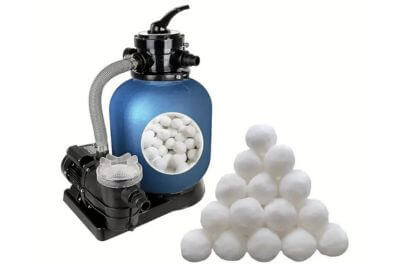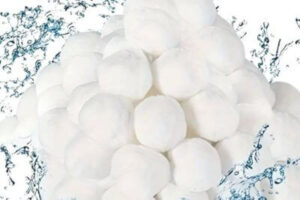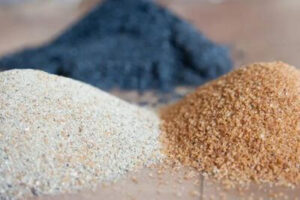Highlighted Features
- Filter balls for pool are usually used for the water filtration in swimming pools, ponds, or other water treatment facilities.
- A great alternative to sand, as 1 cubic box of filter balls perform the same function as 100 lbs. sand filters.
- Filter balls have a higher flow rate(3 microns) than that of filter sand.
- Made of eco-friendly, light weighted polyethylene and available for reuse.
- Can be utilized assisted by a chlorine generator.
What Are the Pool Filter Balls?
These lightweight pool filter balls replace traditional sand infiltration. Small round balls made from high-density polyethylene fiber catch dirt, debris, and particles as small as 3 microns for cleaner and clearer pool water.
Unlike sands, filter balls do not compact over time, are easy to handle, require less maintenance, and provide more efficient filtration that lasts longer between backwashes.
Items | Parameters |
Category | Pool Parts or Accessories |
Materials | Polyester or polyethylene fiber |
Package Types | Vacuum bags, foil bags, or cartons |
Appearance | White spheres or balls like cotton |
Size | 8-10 mm in diameter |
Weight | 0.5-0.7 kg per bag (containing enough filter balls for a typical pool) |
Compatibility | Fit most sand filter appliances |
Application | Pool water cleaning |
Shelf Life | Depending the usage frequency |
Sand vs. Filter Balls
Efficiency
Filter balls can filter as small as 3 microns, while sand can filter around 20 microns. The water is much clearer and has fewer impurities with higher filtration.
Weight and Handling
Filter balls are lighter compared to sand, hence easier to handle and set up and replace. Whereas a normal sand filter may require hundreds of pounds of sand, the same may be true of filter balls, but the latter are often less troublesome.
Savings on Water and Energy
This is because, due to the slow clogging of filter balls, they seldom need to be backwashed. Because of this fact, lots of wasted water and hence energy is saved. They also reduce the amount of effort provided by the pool pumps, which extends the life of such pumps.
Pool Filter Balls Problems
Though filter balls have loads of advantages, some of the problems that may arise include:
Loss of Filtration Efficiency Over Time: Just like all filtration media, they tend to deteriorate and lose efficiency.
Possible Channeling: Because these are light in weight, they might shift to allow small channels through which water passes without getting adequately filtered.
Cleaning Difficulty: The cleaning and rinsing of filter balls have proved a little tricky to some users, especially due to the fact that they trap fine particles.
The usage of pool filter balls can be done in the following way:
Removing Existing Sand: It has to be completely drained of its existing sand that the filter contains.
Install Filter Balls: Fill in the number of filter balls recommended by the manufacturer.
Re-Install Filter: Reassemble everything and prime the filter system again.
Change Settings: Turn the filter on normally. However, since the particles trapped in the filter balls are much quicker in comparison to other filter media, changing the filtration cycle is reasonable.
Swimming Pools: Major ones, since they are bound to provide efficient filtration and clarity of water with reduced maintenance.
Ponds: Quite suitable for ponds due to their capability to trap fine algae and other particles by filter balls.
Aquariums and Fish Tanks: Their filtration abilities make them apt for big aquarium setups where clear and particle-free water is highly required.
Cleaning filter balls is an easy and inexpensive process.
Removing Filter Balls: Take them out from the filter and put them in a large basin or bucket.
Wash and Soak: Wash them properly with clean water, and then soak them in a mild solution of bleach and water to kill bacteria or algae.
Rinse Again: Discard the residual bleach by soaking it in fresh water.
Dry: Allow these balls to air dry before reinstalling them in the filter.
Following are some tips for the safe use of filter balls:
Proper Storage: All filter balls that are not in use should be stored in a cool and dry place away from degeneration.
Avoid Harsh Chemicals: Bleaching should be done on occasions with proper washing to eliminate all residual bleach or other chemical residues in every wash.
Routine Inspection: The periodic examination of balls is based on wear and tear factors. They shall be replaced at any time when the filtration process is no longer working properly.
Dispose Responsibly: If replacing filter balls, please do so in an environmentally sensitive way, since they can be recycled completely.



